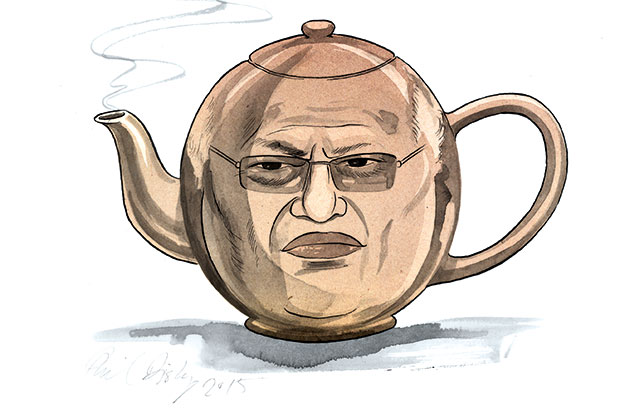‘Milk?…Milk!’ rages Nirmal Sethia, clutching the side of the table in ill-disguised apoplexy. ‘If you put in milk and sugar then you have destroyed the taste! Destroyed it!’
I apologise and say I will happily drink my Earl Grey black. The truth is, I don’t have much choice, because I am trapped in a basement near Smithfield meat market with an impassioned tea magnate.
I never knew there was such a thing, but there really is. Tea is an art form, you see, and although we Brits think we know quite a bit about it — well, we like drinking it morning, noon and night — we actually don’t know anything because we no longer drink proper tea, by and large, and have thus betrayed our great tea heritage. Mr Sethia is very cross about this. So cross that he borders on throwing a full-on tantrum when I ask for semi-skimmed.
To show me what real tea is, the founder of Newby Teas pours me out a small bowl of bright amber-coloured liquid and insists I slurp it with a silver spoon.
As much as 95 per cent of the taste of cheap tea is lost in transit due to poor storage and packaging methods. So a lot of our tea is to proper tea as Blue Nun is to wine, he says. And did I know, he says, pointing his finger in the air, that 99 per cent of that so-called builders’ tea — ‘Pah!’ — that I am buying will have black fungus in it? ‘Black fungus causes cancer!’ he cries, enjoying the look of fear on my face. I did not know this, I say, and I promise Mr Sethia I will be more careful the next time I am in the tea and coffee aisle.
To Sethia, a fine tea is a good deal more complex than a glass of Pétrus. He has his staff make the teas with a thermometer and a stopwatch.
And lo, when you sniff the steamy wet leaves of his deep, strong-tasting Majestic Himalaya it is like being transported to the foothills of Bhutan.
When I sip the bright amber Earl Grey with its pungent Bergamot orange, crisp and delicious, I declare it the best Earl Grey I have ever tasted. ‘And what is wrong with the others?’ demands Mr Sethia, standing over his teas like a proud father who has been told one of his offspring is brighter than the rest.
I am definitely nervous as I taste his most lavish concoction, a tea called Muscani which is priced at around £1,500 for a 100-gram diamond-encrusted caddy. That has got to work out at £50 a swallow, so I sip it frugally.
‘No, no!’ says Mr Sethia — I must slurp, loudly. He grabs the bowl and makes a noise like a gurgling drain being unblocked by a plunger. I try to imitate him.
The taste is so subtle I cannot make head nor tail of it. He tells me there is a hint of musk, now illegal, so it isn’t actually musk but a secret ingredient he cannot possibly tell me about.
After a dozen teas, I beg his indulgence and say I cannot take one more sip. My palate is suffused. I have run out of adjectives. Mr Sethia seems happy with this. He is in a state of extreme excitation as he tells me how he is trying to give something precious and wonderful to the British, but they don’t always seem to want to cooperate. He talks of tea, at first, but then suddenly we are on the subject of politics and the precious thing he seems to be offering is not just tea, it is his whole operation, nay himself.
You see, Mr Sethia, in common with a lot of other Indian tycoons, is feeling increasingly upset at being targeted by the Exchequer, egged on by a public baying for rich foreigners to pay more tax.
He regards the noises being made by George Osborne about a forthcoming clampdown on ‘non-doms’, as deeply rude, crass, ungrateful, a personal affront.
The Chancellor announced in his budget that people like Mr Sethia — effectively resident in Britain but still legally domiciled in their native land, for tax reasons — will no longer be able to have permanent ‘non-dom’ status and that anyone resident in the UK for 15 of the past 20 years will pay full UK tax from April 2017, a move which he estimated would bring in an extra £1.5 billion a year.
It is the tone more than anything that upsets Mr Sethia. The idea of a clampdown panders to left-wing prejudice and the politics of envy, which ill behoves the Conservatives, he says.
He points out that he already pays UK taxes. He also donates 30 per cent of the profits of Newby Teas to charity. He funds the robotic surgery research centre at University College London. His business employs 4,000 people worldwide with 40 in his London headquarters. What’s more, he is not the idle rich, he is a self-made man.
At 14, Sethia worked as an apprentice tea taster. At 16 he engaged his entrepreneurial spirit and started his own tea-buying business in Calcutta.
He loves Britain and feels at home here. He could go to Switzerland and his sons would pay virtually no inheritance tax but he stays in London, creating wealth here, spending his money here, paying income tax and capital gains on everything pertaining to here. So why are we not grateful? Why is a Conservative government baying for billionaires’ blood? Why indeed.
‘Osborne is sounding the voice of the dying Labour party. Like Robin Hood, you rob the rich to feed the poor.
‘So they are getting rid of non-doms. But then they are letting in all these people who come in and live on the dole. We are sending the right people away and getting the wrong people in.’
Sethia makes clear, however, that if Osborne really doesn’t want non-doms, then they can always leave.
And if anyone thinks this is an idle threat he has news for them. He says he is being head-hunted to move his family home and headquarters to another jurisdiction. Many of his Indian friends are also being interviewed by foreign delegations coming to London to lure them away before 2017. He reels off the names of industrial magnates being targeted, then forbids me to repeat them, which I have to promise to do.
‘The Swiss, Hong Kong, the Singaporeans, they are all saying “Come!” The Singaporeans are coming to see me to make their pitch in a few weeks.’ It is a startling revelation. There are, it seems, secret visitations going on all over London right now, as foreign delegations attempt to lure our persecuted rich away.
Will he go? He shrugs. ‘I don’t know how long I am here, but my children are already saying “Dad, it is getting harder. We want to go to Dubai, or to Hong Kong where we will not be harassed and the weather is better.” The Abu Dhabis want the Indians. They have allowed the construction of the first Hindu temple there, did you know that? They know we Indians are a good thing.’
More than a thousand non-doms in all will leave Britain, he predicts. ‘The big boys, they are all going to run. They will move their headquarters to other countries. They will say no, I’m not going to do more expansion here.’
It wouldn’t take much more than a scribble of basic arithmetic on the back of a tea packet to work out that if all these tycoons did go, it would be a disaster for Britain. In fact, when you think about it, it seems utter lunacy for politicians to have calculated what it will bring in if all the non-doms pay up more, but not to have calculated what it will take away if they all leave instead.
Mr Sethia has real hurt in his eyes as he laments the hounding of wealth-creators. Suddenly, I am put in mind of his face as he poured out a sample of his precious elixir and I asked if I could add milk.
He has the same baffled look now. It is a look that says: ‘You just can’t help some people.’
Got something to add? Join the discussion and comment below.
Get 10 issues for just $10
Subscribe to The Spectator Australia today for the next 10 magazine issues, plus full online access, for just $10.
You might disagree with half of it, but you’ll enjoy reading all of it. Try your first month for free, then just $2 a week for the remainder of your first year.















Comments
Don't miss out
Join the conversation with other Spectator Australia readers. Subscribe to leave a comment.
SUBSCRIBEAlready a subscriber? Log in